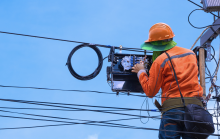Trump Administration Imposed BEAD Changes Introduce Significant New Delays
Trump administration changes to the $42.5 billion Broadband Equity, Access, and Deployment (BEAD) grant program are poised to introduce years of potential new delays to the already slow-moving program, potentially undermining the program’s goal of bringing universal broadband access to mostly rural communities.
Worse, the looming changes would eliminate efforts to ensure taxpayer-funded broadband is affordable for low-income Americans, while driving billions in new subsidies to the world’s richest man and Trump mega donor Elon Musk.
Testifying this week before a Senate Appropriations Committee, Commerce Secretary Howard Lutnick confirmed that the National Telecommunications and Information Administration (NTIA) will "soon" issue a new Notice of Funding Opportunity (NOFO) that states will have 90 days to respond to.
The revisions will ensure that billionaire Elon Musk – and his capacity-constrained satellite broadband network Starlink – will receive significantly more taxpayer money. Such Low-Earth orbit satellite networks were slated to get some funds, but federal changes may result in them dominating grant funding, overruling the mix of technology states had originally preferred.
Other changes being implemented include elimination of provisions ensuring affordable access for low-income Americans.




